German actor and writer Albert Matterstock (1909-1960) belonged to the group of successful young actors from the mid-1930s who conquered the heart of the German public with entertainment films. He made 40 films before he died as a result of his morphine addiction.
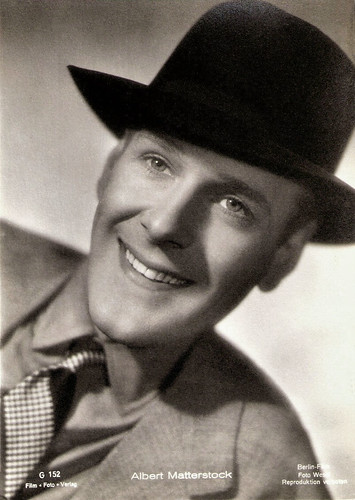
German postcard by Film-Foto-Verlag, no. G 152. Photo: Foto Wesel / Berlin Film.
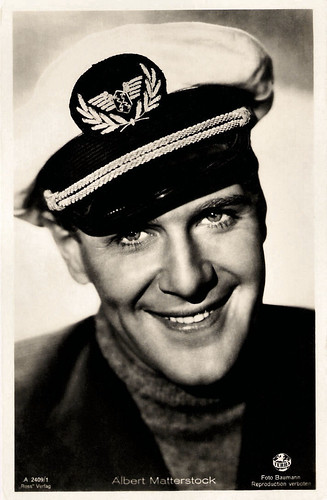
German postcard by Ross Verlag, no. A 2409/1,1939-1940. Photo: Baumann / Terra.
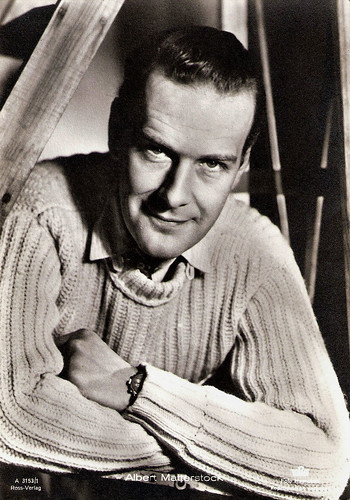
German postcard by Ross Verlag, no. A 3153/1, 1941-1944. Photo: Tobis / Haenchen.
Albert Andreas Hermann Walter Matterstock was born in Leipzig in 1909 as the son of a cavalry officer. He attended the Colonial School in Witzenhausen, and later lived till his 21st birthday with relatives in Africa.
Matterstock had acting classes in Berlin from Austrian director Leontine Sagan at the Max Reinhardt Seminar. He made his stage debut at the Theater am Kurfürstendamm, and soon he became known as a portrayer of elegant men of the world.
Reinhold Schünzel discovered him for the cinema. His debut, Land der Liebe / Land of Love (Reinhold Schünzel, 1937), made him immediately a popular star. Many of his following films would be box office hits, and he became one of the highest-paid stars of the Ufa.
To those films belong romances and comedies like Serenade (Willi Forst, 1937) with Hilde Krahl, Stimme des Blutes / Voice of the Blood (Carmine Gallone, 1937) opposite Anneliese Uhlig, Ziel in den Wolken / Goal in the Clouds (Wolfgang Liebeneiner, 1938) with Leny Marenbach and Brigitte Horney.
His other films of the period include Gastspiel im Paradies / Guest performance in paradise (Karl Hartl, 1938) again opposite Hilde Krahl, Lauter Lügen / Many Lies (Heinz Rühmann, 1938) with Hertha Feiler, and Ein ganzer Kerl / A Regular Fellow (Fritz Peter Buch, 1939) with Heidemarie Hatheyer.
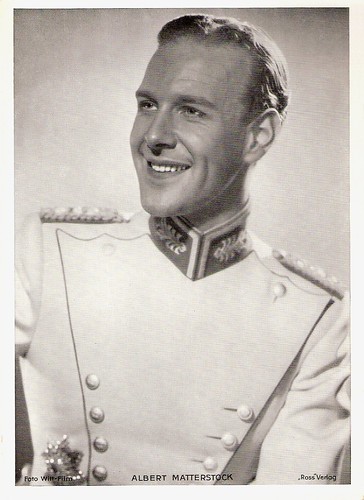
Big German card by Ross Verlag. Photo: Witt-Film.
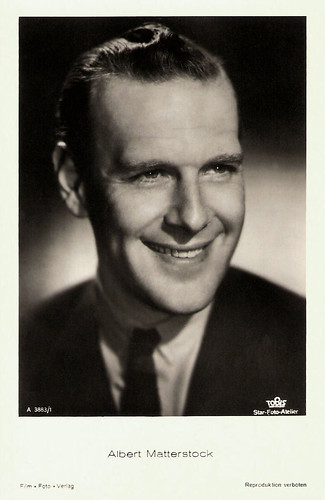
German postcard by Film-Foto-Verlag, no. A 3883/1, 1941-1944. Photo: Tobis / Star-Foto-Atelier.
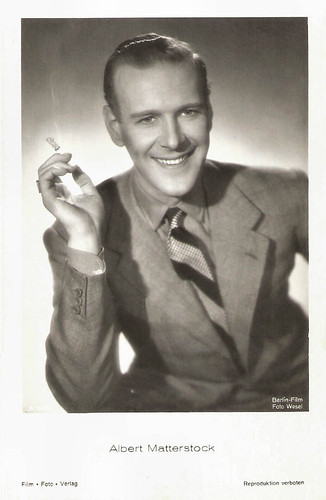
German postcard by Film-Foto-Verlag, no. A 3686/1, 1941-1944. Photo: Foto Wesel / Berlin Film.
During wartime Albert Matterstock went on to play roles in comedies like Unser Fräulein Doktor / Our Miss Doctor (Erich Engel, 1940) with Jenny Jugo, Das himmelblaue Abendkleid / Charivan (Erich Engel, 1941) with Elfie Mayerhofer, Kollege kommt gleich / My Colleague is Coming (Karl Anton, 1943) with Carola Höhn, Ein Walzer mit Dir / A Waltz With You (Hubert Marischka, 1943) opposite Lizzi Waldmüller, and Frühlingsmelodie / Springtime Melody (Hans Robert Bortfeld, 1945).
In 1943, he was wounded during the shooting of a film at sea, and he was treated with morphine. It soon became a nasty habit. After the war, Albert Matterstock wasn't able to go on from his earlier successes. He only was offered supporting parts.
To his few post-war films belong mediocre fare like Spuk im Schloß / A Ghost in the Castle (Hans H. Zerlett, 1947), Schuss um Mitternacht / A Shot at Midnight (Hans H. Zerlett, 1949), and Drei Birken auf der Heide / Three Birch Trees at the Moor (Ulrich Erfurth, 1956).
He mostly worked in the theatre, but he also had to earn his money as a car salesman and a barkeeper. At some periods, he was even homeless.
In 1960, Albert Matterstock died in a hotel in Hamburg at the age of 49 as a result of his morphine addiction. He was married four times, a.o. to Margot Rauh and actress Jutta Freybe. Next to his work as an actor, he also wrote novels, scripts and essays.
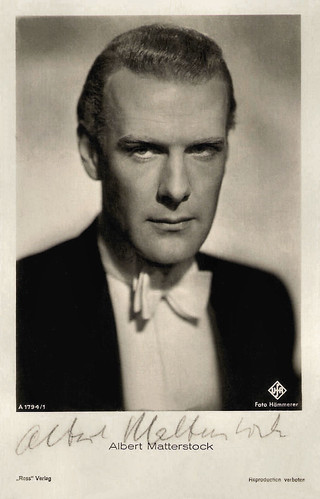
German postcard by Ross-Verlag, no. A 1794/1, 1937-1938. Photo: Ufa / Hämmerer.
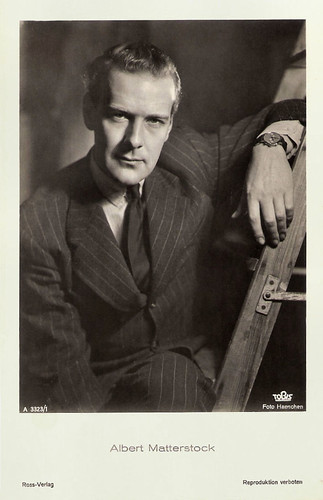
German postcard by Ross Verlag, no. A 3323/1, 1941-1944. Photo: Tobis / Haenchen.
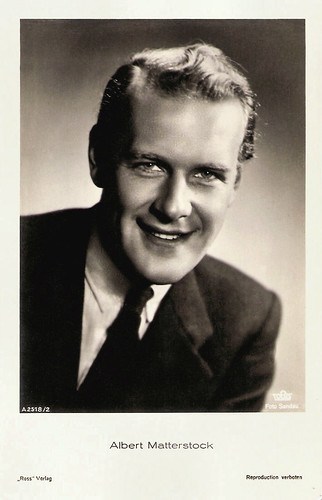
German postcard by Ross Verlag, no. A 2518/2, 1939-1940. Photo: Tobis / Sandau.
Sources: Thomas Staedeli (Cyranos), Stephanie D'Heil (Steffi-line - German), Wikipedia (German), and IMDb.
This post was last updated on 13 June 2025.

German postcard by Film-Foto-Verlag, no. G 152. Photo: Foto Wesel / Berlin Film.

German postcard by Ross Verlag, no. A 2409/1,1939-1940. Photo: Baumann / Terra.

German postcard by Ross Verlag, no. A 3153/1, 1941-1944. Photo: Tobis / Haenchen.
Elegant men of the world
Albert Andreas Hermann Walter Matterstock was born in Leipzig in 1909 as the son of a cavalry officer. He attended the Colonial School in Witzenhausen, and later lived till his 21st birthday with relatives in Africa.
Matterstock had acting classes in Berlin from Austrian director Leontine Sagan at the Max Reinhardt Seminar. He made his stage debut at the Theater am Kurfürstendamm, and soon he became known as a portrayer of elegant men of the world.
Reinhold Schünzel discovered him for the cinema. His debut, Land der Liebe / Land of Love (Reinhold Schünzel, 1937), made him immediately a popular star. Many of his following films would be box office hits, and he became one of the highest-paid stars of the Ufa.
To those films belong romances and comedies like Serenade (Willi Forst, 1937) with Hilde Krahl, Stimme des Blutes / Voice of the Blood (Carmine Gallone, 1937) opposite Anneliese Uhlig, Ziel in den Wolken / Goal in the Clouds (Wolfgang Liebeneiner, 1938) with Leny Marenbach and Brigitte Horney.
His other films of the period include Gastspiel im Paradies / Guest performance in paradise (Karl Hartl, 1938) again opposite Hilde Krahl, Lauter Lügen / Many Lies (Heinz Rühmann, 1938) with Hertha Feiler, and Ein ganzer Kerl / A Regular Fellow (Fritz Peter Buch, 1939) with Heidemarie Hatheyer.

Big German card by Ross Verlag. Photo: Witt-Film.

German postcard by Film-Foto-Verlag, no. A 3883/1, 1941-1944. Photo: Tobis / Star-Foto-Atelier.

German postcard by Film-Foto-Verlag, no. A 3686/1, 1941-1944. Photo: Foto Wesel / Berlin Film.
Morphine
During wartime Albert Matterstock went on to play roles in comedies like Unser Fräulein Doktor / Our Miss Doctor (Erich Engel, 1940) with Jenny Jugo, Das himmelblaue Abendkleid / Charivan (Erich Engel, 1941) with Elfie Mayerhofer, Kollege kommt gleich / My Colleague is Coming (Karl Anton, 1943) with Carola Höhn, Ein Walzer mit Dir / A Waltz With You (Hubert Marischka, 1943) opposite Lizzi Waldmüller, and Frühlingsmelodie / Springtime Melody (Hans Robert Bortfeld, 1945).
In 1943, he was wounded during the shooting of a film at sea, and he was treated with morphine. It soon became a nasty habit. After the war, Albert Matterstock wasn't able to go on from his earlier successes. He only was offered supporting parts.
To his few post-war films belong mediocre fare like Spuk im Schloß / A Ghost in the Castle (Hans H. Zerlett, 1947), Schuss um Mitternacht / A Shot at Midnight (Hans H. Zerlett, 1949), and Drei Birken auf der Heide / Three Birch Trees at the Moor (Ulrich Erfurth, 1956).
He mostly worked in the theatre, but he also had to earn his money as a car salesman and a barkeeper. At some periods, he was even homeless.
In 1960, Albert Matterstock died in a hotel in Hamburg at the age of 49 as a result of his morphine addiction. He was married four times, a.o. to Margot Rauh and actress Jutta Freybe. Next to his work as an actor, he also wrote novels, scripts and essays.

German postcard by Ross-Verlag, no. A 1794/1, 1937-1938. Photo: Ufa / Hämmerer.

German postcard by Ross Verlag, no. A 3323/1, 1941-1944. Photo: Tobis / Haenchen.

German postcard by Ross Verlag, no. A 2518/2, 1939-1940. Photo: Tobis / Sandau.
Sources: Thomas Staedeli (Cyranos), Stephanie D'Heil (Steffi-line - German), Wikipedia (German), and IMDb.
This post was last updated on 13 June 2025.
Debonair in his youth. Very sad that he lost so much to morphine.
ReplyDeleteSo many wounded soldiers became addicted to morphine. But there were no other ways to make their pain bearable in those days. New wars, new weapons and new, more severe injuries. Medical science could not keep up.
ReplyDelete